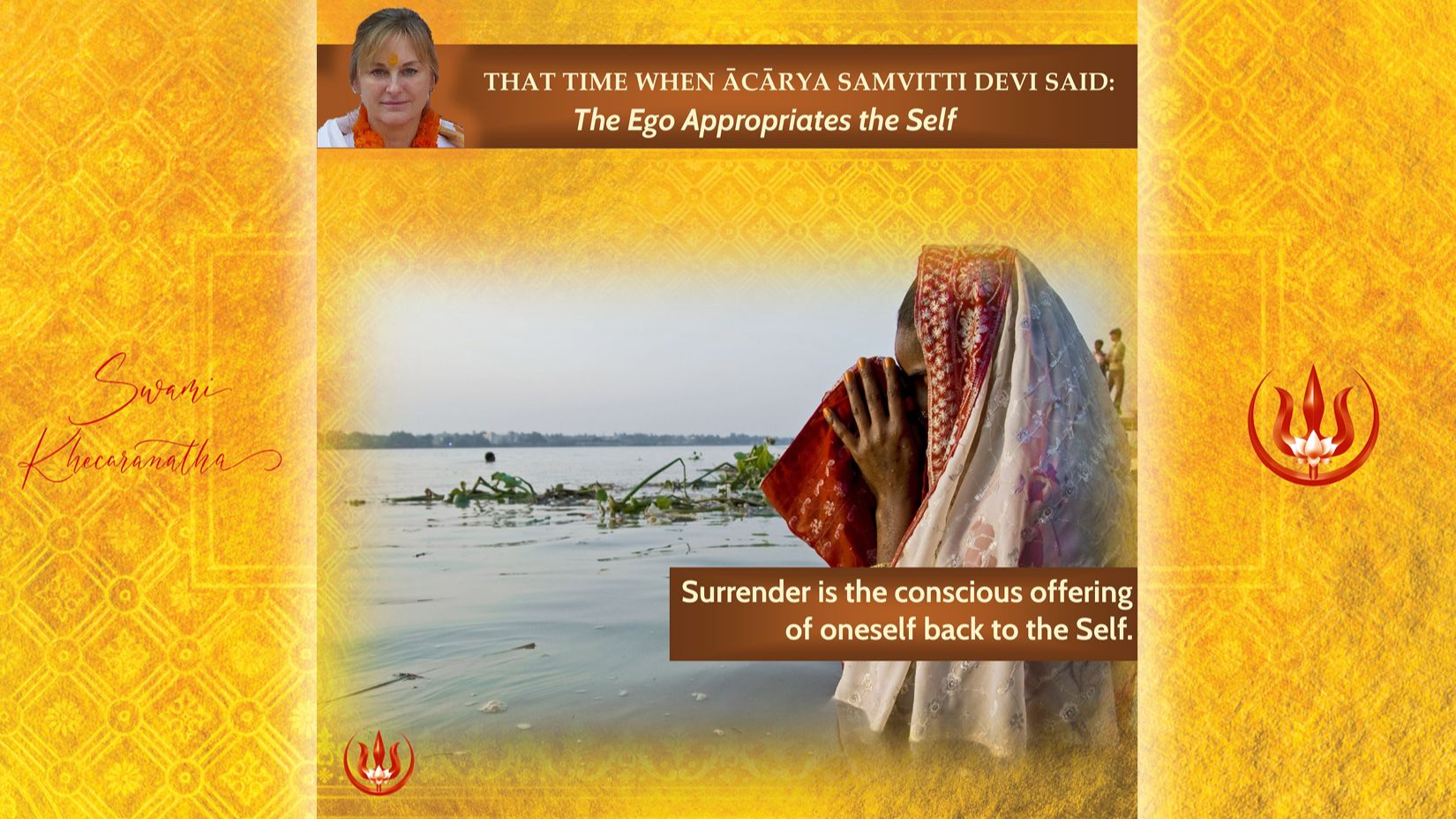The Three Levels of Surrender

Surrender is the conscious offering of oneself back to the Self. — Swami Khecaranatha
Samvitti’s words, the ego appropriates the Self, succinctly explain how the limited part of us called ego perpetuates its own existence through the freedom of choice given to all individuals.
The ego binds us in separation and suffering — in an unwillingness and inability to know the pure joy of our Source, which is ever-present within us.
God’s pure, infinite Consciousness has within it every level of consciousness, even the limited level of ego. We are always part of that Unity, but because we are attached to our separate identity, we must surrender that self-image. This must be a conscious act of offering ourselves back to the very power of freedom that gives us the capacity to offer our selves back!
What does it mean to surrender something, and how do we surrender the mind, which is the agent of ego? There are three conscious acts of surrender:
1) Surrendering Something
In this first act, we must recognize that it is the surrendering of things, of circumstance, that develops the muscle of surrender. Although we might have a mental list of what we are unwilling to surrender, our life continually presents us with the opportunity to consciously let go of things.
Our need for money is a “thing,” but this is not a discussion about paying the rent. There is a place inside that feels I must have a big bank account in order to feel secure. The same principle applies to needing to have somebody to love — and isn’t it amazing that a person we might wish to love becomes an object to obtain?
Perhaps we have to surrender what we would like to have happen, or maybe something is happening that we wish would disappear. Those are the conditions we feel the need to change in order to be happy. We can have anything in life; it has been given to us to celebrate the abundance of everything. But the need to have creates an incessant bondage to condition and this is what must be surrendered. Conditions only bind us in our minds, in our judgement that something is bad or good.
In a state of equanimity, we see that all conditions are like waves on the ocean. They arise and subside on the field of our own awareness, revealing themselves precisely so that we can understand how bound we are by them. Instead of fighting with a dynamic or trying to suppress it, recognize that the swelling of some reaction in you is in fact the gift. Once we can do that, we begin to develop the inner mechanism and the insight for the second category of surrender.
2) Surrender to the Śakti
Śakti is the power of God that is expressing our life and presenting us with every opportunity to open in the face of difficulty. Truly surrendering to the śakti means allowing that vital force to expose all our misunderstanding, attachments, contractions, and karma. When we see those patterns, we can then transform and convert that contracted energy into flow, so that the liberated energy can be directed into our psychic body, the deeper core of our consciousness.
Kuṇḍalinī Sādhana means surrendering to the śakti that is awakening in us through the grace of God. We are allowing that śakti to sculpt our life and free us from our misunderstanding of who we are and what we need. Due to this inner trust, we stop negotiating and battling with God about what our life should look like.
There is extraordinary beauty in offering ourselves and saying show me my life. But if we keep grasping for something we feel we lack, we have not really surrendered to the śakti. That vital force is doing one thing: freeing us from our limited self. If we come up against an unwillingness to let go, śakti serves as a mirror that reveals our resistance, which is sustained by the grip of the mind. Our thought-constructs are the device the ego uses to steal our freedom and appropriate the self.
3) The State of Surrender
When we can truly surrender to the śakti, then the list of what we will and will not surrender disappears. We live in the unconditional surrender that is the response to the very request we made when we said, I wish to know God.
Once we free ourselves from the bondage of our misunderstanding, we recognize how the ego appropriated the Self. We begin to live as an embodiment of God’s divine powers of Consciousness, bliss, will, knowledge, and action. These are the powers of God’s autonomous freedom that burst from the pure joy of His own existence, out into energy and manifest form.
Living in the state of surrender, we have moved beyond all disbelief, doubt, fear, and the need to control life. We have had the extraordinary insight, the miraculous joy of recognizing that all that was necessary was to consciously offer our limited understanding into a higher understanding. We know that life is precious in its purpose, which is to know our highest Self.
